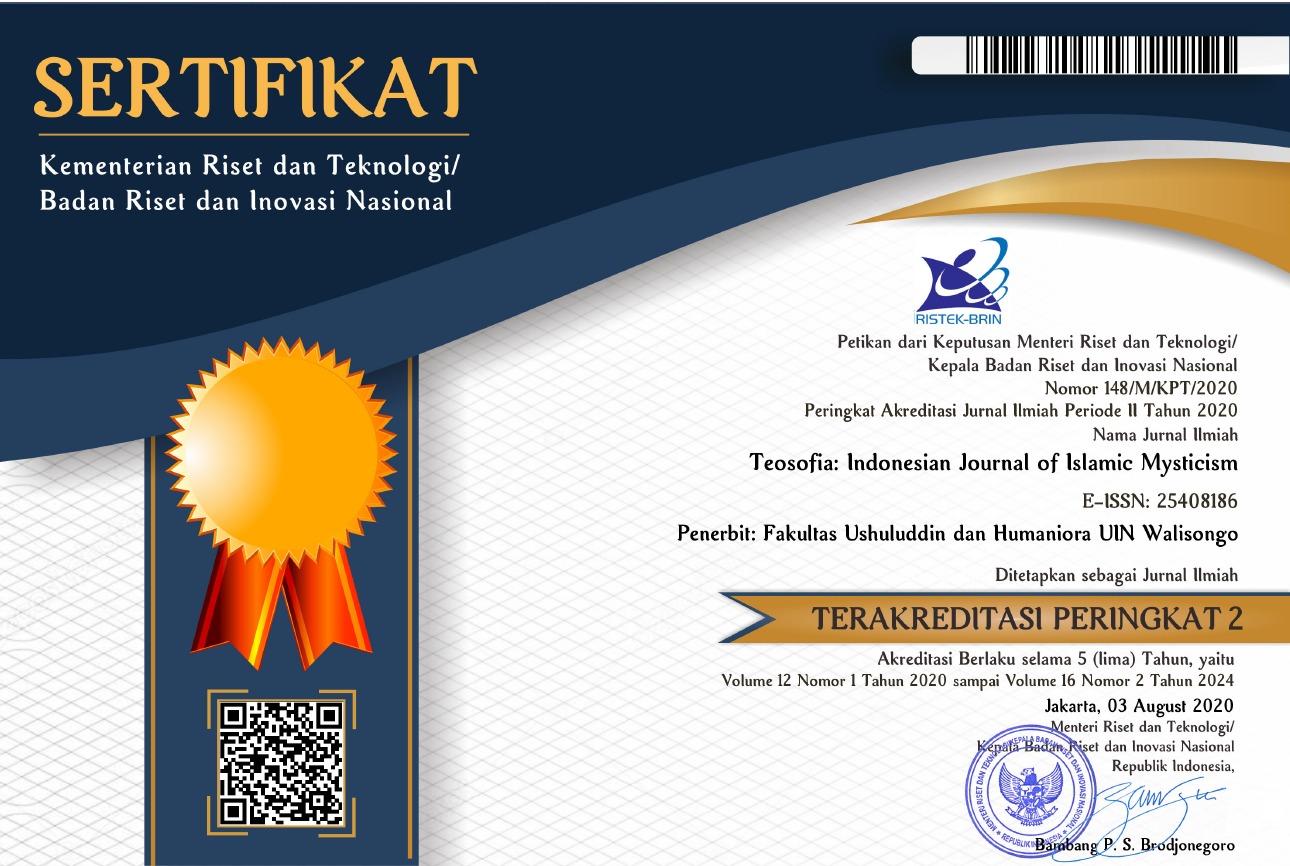The Dynamics and Role of Sufism in Turkish Politics and Society
DOI:
https://doi.org/10.21580/tos.v11i2.12443Keywords:
dynamics, Sufism, society, politics, TurkeyAbstract
Sufism is widespread in Turkey, and most Turkish people sympathise with the Sufis even if they do not adhere to particular Sufi orders. Sufism has been rooted in Turkish society throughout history and has experienced ups and downs. This article is a literature study that used a qualitative approach and descriptive analysis. Data were collected from documents, literature, and journals. This study found that Sufism was not entirely swept up by secularisation, particularly in rural areas. Even in urban areas, many still adhere to Islamic traditions, including Sufism, passed down from generation to generation. Furthermore, Sufism influenced the political world in Turkey and the period preceding the Ottoman Empire's collapse. Even after that, a new pattern of Sufism emerged, namely Sufism without order, which resulted from understanding the Risale-i Nur, written by Said Nursi.
Contribution: This article is expected to explain the role of Sufism in Turkey during the classical period as an agent of moderate Islam propagation who built a spirit of struggle. This study shows that Sufism in Turkey has different understandings from others that distance themselves from political matters, social activities, and state affairs.
Downloads
References
Abu-Manneh, Butrus. ‘IV. The Naqshbandi-Mujaddidi and the Bektashi Orders in 1826’. In Studies on Islam and the Ottoman Empire in the 19th Century (1826 - 1876), 59–72. Gorgias Press, 2011. https://doi.org/10.31826/9781463229931-005.
Al-Muhami, Muhammad Farid Bek. Tarij Al-Dawla Al-’Aliyya Al-’Utmaniyya. Beirut: Dar al Nafa’is, 2009.
Ari, Hulya. ‘Corrigenda: Secular Risk Governance and the Turkish Military’s Battle with Political Islam, 1980s–2000s’. Security Dialogue 49, no. 3 (2018): 306–323. https://doi.org/10.1177/0967010618809037.
Asghari, Seyedamirhossein. ‘The Bektashi Order, Sufism, and Shi’ism in the Work of Baba Rexheb, a Bektashi Sufi of 20th Century’. Turkish Journal of Shiite Studies 3, no. 1 (27 April 2021): 51–74. https://doi.org/10.48203/siader.799560.
Asghari, SeyedAmirHossein. ‘A Short Survey on the Common Doctrines Between the Bektashi Order and Shi’a Islam’, January 2021. https://doi.org/10.22541/au.161072800.02824298/v1.
Atçıl, Abdurrahman. Scholars and Sultans in the Early Modern Ottoman Empire. Cambridge University Press, 2016. https://doi.org/10.1017/9781316819326.
Avatkov, Vladimir A. ‘Populism in the Foreign Policy of the Turkish Republic’. Vestnik RUDN. International Relations, 2021. https://doi.org/10.22363/2313-0660-2021-21-3-543-554.
Beīk, Ahmād Ibrāhim, and Wāsil Ala’-ad-Dīn Ahmad Ibrāhim. Kitāb Al Shariah Al-Islamiyah Al-Ahwal as-Sāhsiya Al-Ahliya Wa-Awāriduha: Wa Ahkām at-Tasarruf ’an-Al-Gair Al-Wilāya. Al-Wisāya, 2015.
Belhaj, Abdessamad. ‘Legal Knowledge by Application: Sufism as Islamic Legal Hermeneutics in the 10th/12th Centuries’. Studia Islamica 108, no. 1 (2013): 82–107. https://doi.org/10.1163/19585705-12341276.
Cifci, Ibrahim. ‘Testing Self-Congruity Theory in Bektashi Faith Destinations: The Roles of Memorable Tourism Experience and Destination Attachment’. Journal of Vacation Marketing 28, no. 1 (26 January 2022): 3–19. https://doi.org/10.1177/13567667211011758.
Erickson, Edward J., and Adam Hook. Mustafa Kemal Atatürk: Leadership, Strategy, Conflict. Oxford; Long Island City, NY: Osprey, 2013.
Firdaus, Yelmi Eri, Elfia Elfia, and Meirison Meirison. ‘RISE AND FALL OF MAMLUK SULTANATE: The Struggle Against Mongols and Crusaders in Holy War’. Al-Adyan: Journal of Religious Studies 1, no. 1 (6 August 2020): 14–28. https://doi.org/10.15548/al-adyan.v1i1.1713.
Gani, A. ‘Urgency Education Morals of Sufism in Millennial Era’. Journal for the Education of Gifted Young Scientists 7, no. 3 (16 September 2019): 547–61. https://doi.org/10.17478/jegys.603574.
Günther, Sebastian, ed. Knowledge and Education in Classical Islam: Religious Learning between Continuity and Change. Vol. 172. Islamic History and Civilization. {Studies} and Texts. Boston: Brill, 2020.
Hatina, Meir. ‘Where East Meets West: Sufism, Cultural Rapprochement, and Politics’. International Journal of Middle East Studies 39, no. 3 (2 August 2007): 409b-409b. https://doi.org/10.1017/S0020743807070948.
Huda, Sokhi. ‘Fethullah Gülen’s Perspective on Sufism (Translated from Indonesian Slide)’. Hizmet Talks, 2021. https://doi.org/10.5281/ZENODO.4557872.
Karakaya-Stump, Ayfer. The Kizilbash-Alevis in Ottoman Anatolia: Sufism, Politics and Community. Scotland, UK: Edinburgh University Press, 2021.
Korkmaz, Mehmet, and Cemil Osmanoğlu. ‘Küreselleşmenin Birey ve Toplum Hayatına Etkileri ve Din Eğitimi’,. MANAS Sosyal Araştırmalar Dergisi 8, no. 1 (2019): 951–67. https://doi.org/10.33206/mjss.483914.
Lipton, G. A. ‘Secular Sufism: Neoliberalism, Ethnoracism, and the Reformation of the Muslim Other’. The Muslim World 101, no. 3 (July 2011): 427–40. https://doi.org/10.1111/j.1478-1913.2011.01389.x.
Maleki, Farida. Jalal Al-Din Rumi (Divan-e Shams-e Tabrizi). Punjab: Radha Soami Satsang Beas, 2019.
Marjuni, Kamal al-Din Nur al-Din. Al-’Aqidah Al-Islamiyah Wa-Al-Qadaya Al-Khilafiyah ’inda ‘Ulama’ Al-Kalam Dirasah Muqaranah. Beirut: Dar al-Kutub al-’Ilmiyah, 2014.
Masters, Bruce. The Arabs of the Ottoman Empire, 1516–1918. Cambridge University Press, 2013. https://doi.org/10.1017/CBO9781139521970.
Mubārakfūrī, ʻUbayd Allāh ibn Muḥammad ʻAbd al-Salām, and Muḥammad Sulaymān ibn Muḥammad Amīn. Marʻāt Al-Mafātīḥ Sharḥ {Mishkāt} Al-Maṣābīḥ. Al-Ṭabʻah. al-Riyāḍ: Madār al-Qabas lil-Nashr wa-al-Tawzīʻ, 2017.
Muedini, Fait. ‘Sufism and Anti-Colonial Violent Resistance Movements: The Qadiriyya and Sanussi Orders in Algeria and Libya’. Open Theology 1, no. 1 (3 January 2015): 134–45. https://doi.org/10.1515/opth-2015-0003.
Ortayli, Elber. The Ottoman Caliphate: Modernization and Modernity in the Nineteenth Century. Bustān al-Ma’rifah Library for Printing, Publishing and Distribution, 2007. https://books.google.co.id/books?id=7QretAEACAAJ.
Papas, Alexandre, ed. Sufi Institutions. Vol. 154/1. Handbook of Sufi Studies. Leiden; Boston: Brill, 2020.
Peacock, Andrew, and Annabel Teh Gallop, eds. From Anatolia to Aceh: Ottomans, Turks, and Southeast Asia. First edit. Proceedings of the British Academy. Oxford: British Academy, 2015. https://doi.org/10.5871/bacad/9780197265819.001.0001.
Puppo, Lili Di, and Jesko Schmoller. ‘Here or Elsewhere: Sufism and Traditional Islam in Russia’s Volga-Ural Region’. Contemporary Islam 14, no. 2 (11 July 2020): 135–56. https://doi.org/10.1007/s11562-018-00434-3.
Qaraḍāwī, Yūsuf, and Qaraḍāwī Yūsuf. Al-Siyāsah Al-Sharʻīyah Fī Ḍawʼ Nuṣūṣ Al-Sharīʻah Wa-Maqāṣidihā. Al-Ṭabʻah. Naḥwa Waḥdah Fikrīyah Lil-ʻāmilīn Lil-Islām. al-Qāhirah: Maktabat Wahbah, 1998.
Senay, Banu. ‘Artists, Antagonisms and the Ney in the Popularization of “Sufi Music” in Turkey’. European Journal of Cultural Studies 18, no. 1 (2015): 52–69. https://doi.org/10.1177/1367549414557805.
Shafak, Elif. The Forty Rules of Love. London: Viking, 2010.
Syukur, M Amin, and Abdul Muhaya. ‘Economic Movements within Sufism in Java: A Case Study on Qadiriyah and Naqsyabandiyah Sufi Orders’. Journal of Indonesian Islam 9, no. 2 (16 December 2015): 229–56. https://doi.org/10.15642/JIIS.2015.9.2.229-256.
Tezcan, Baki. ‘Hanafism and the Turks in Al-Tarasusi’s Gift for the Turks (1352) (MSR XV, 2011)’. Mamluk Studies Review XV (2011): 67–86. https://doi.org/10.6082/M11J97WM.
Wilson, M Brett. ‘The Twilight of Ottoman Sufism: Antiquity, Immorality, and Nation in Yakup Kadri Kadri Karaosmanoğlu’s Nur Baba’. International Journal of Middle East Studies 49, no. 2 (20 May 2017): 233–53. https://doi.org/10.1017/S0020743817000034.
Yemelianova, Galina M, and Egdūnas Račius, eds. Muslims of Post-Communist {Eurasia}. Routledge Studies in Religion. London ; New York, NY: Routledge, Taylor & Francis Group, 2023.
Yılmaz, Hacı. ‘Bektâshism According to Ahmed Sirri Dedebaba Who Is the Last Postnishin of Cairo Bektashism Dervish Lodge’. Journal of Human Sciences 14, no. 4 (27 October 2017): 3310–27. https://doi.org/10.14687/jhs.v14i4.4691.
Yükleyen, Ahmet. ‘Sufism and Islamic Groups in Contemporary Turkey’. In The Cambridge History of Turkey, edited by Reşat Kasaba, 381–87. Cambridge University Press, 2008. https://doi.org/10.1017/CHOL9780521620963.015.
Zaleski, John. ‘Sufi Asceticism and the Sunna of the Prophet in Al-Junayd’s Adab Al-Muftaqir Ilā Allāh’. Journal of Islamic Studies 32, no. 1 (1 January 2021): 1–26. https://doi.org/10.1093/jis/etaa051.
Zare-Behtash, Esmail. ‘Images of “Love” and “Death” in the Poetry of Jaláluddin Rumi and John Donne’. International Journal of Applied Linguistics and English Literature 6, no. 2 (4 January 2017): 97–105. https://doi.org/10.7575/10.7575/aiac.ijalel.v.6n.2p.97.
Downloads
Published
How to Cite
Issue
Section
License
Copyright
The copyright of the received article shall be assigned to the journal as the publisher of the journal. The intended copyright includes the right to publish the article in various forms (including reprints). The journal maintains the publishing rights to the published articles. Therefore, the author must submit a statement of the Copyright Transfer Agreement.*)
Licensing

This work is licensed under a Creative Commons Attribution-ShareAlike 4.0 International License.
In line with the license, authors are allowed to share and adapt the material. In addition, the material must be given appropriate credit, provided with a link to the license, and indicated if changes were made. If authors remix, transform or build upon the material, authors must distribute their contributions under the same license as the original.
_______
*) Authors whose articles are accepted for publication will receive confirmation via email and send a Copyright Transfer Agreement.








